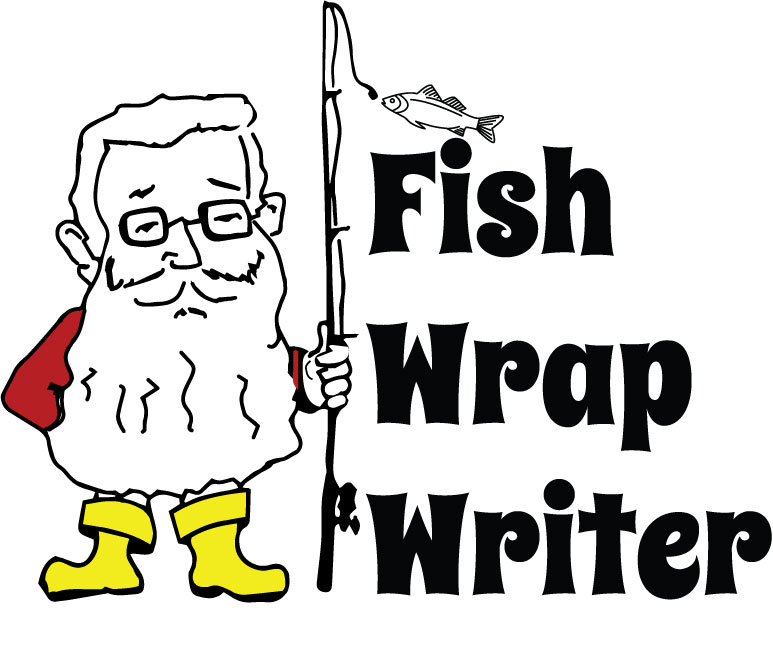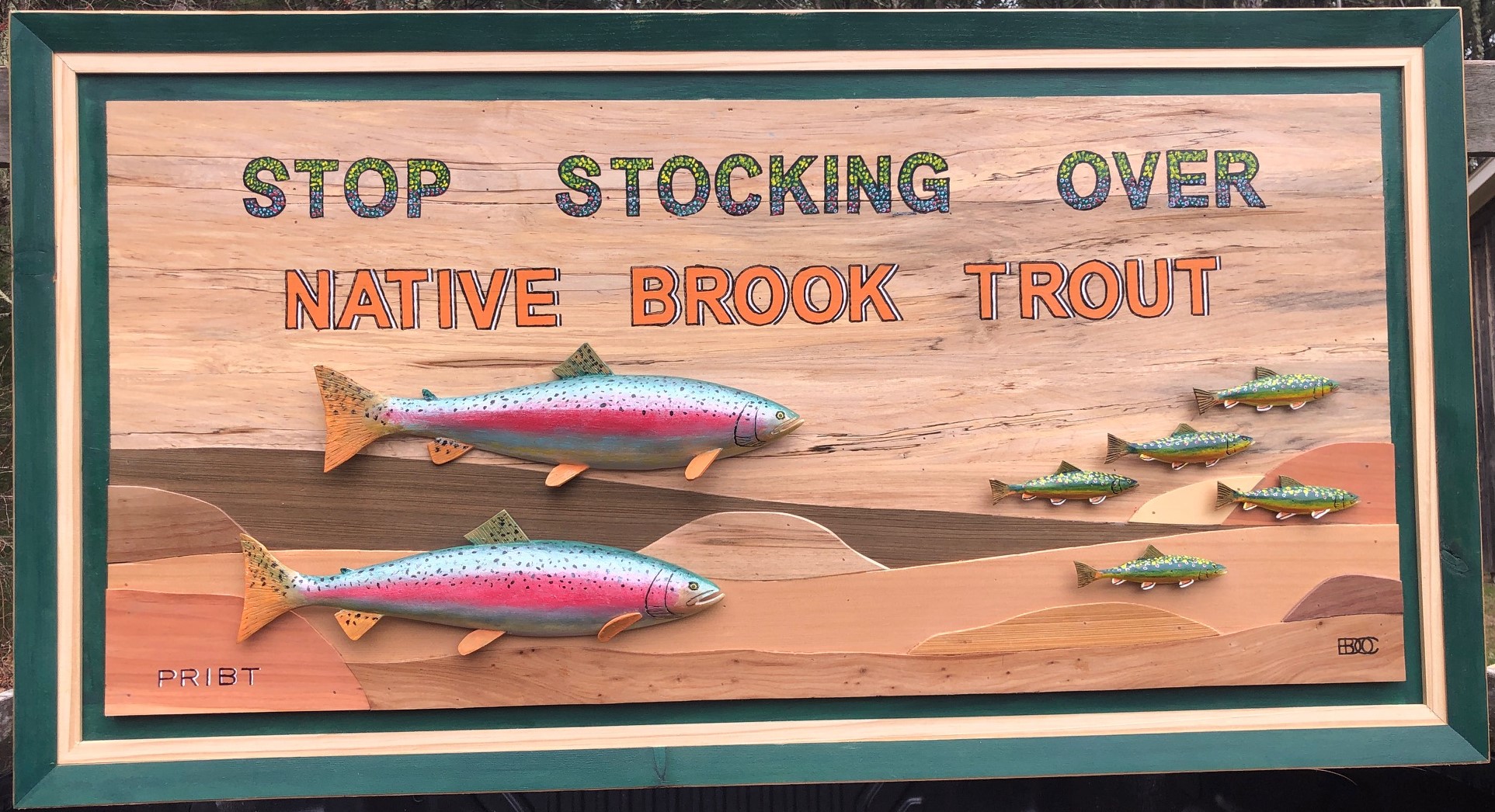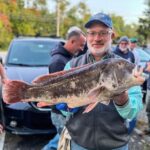The Rhode Island chapter of Trout Unlimited has made a bold move to protect native fishes and their essential habitat. RITU Chapter President, Glenn Place, has initiated, spoken about, argued for and stood his ground when it came to protecting trout and now, bucking a tradition of historical participation from TU members, President Place is calling for an end to stocking trout in the upper Wood River Watershed.
Stocking was accepted and handily funded for generations but such reliance on hatcheries to fix what we diminished is being actively questioned. RITU members historically assisted RIDEM with float stocking brown, rainbow and brook trout throughout the Wood. Stocking does serve a purpose, as we have covered substantially here but Glenn’s announcement is focused on what many knew we should never do: stock hatchery-raised trout, two species of which are non-native, over established populations of wild trout.
It was a long road to this position statement.
“They wanted new evidence of a self-sustaining population,” Glenn said, referring to state agencies’ hesitation to change regulations, policies or even accept that wild brookies were up there. “That led to our work in the Big River Management Area and the Beaver River.”
For years, the Protect RI Brook Trout group opposed such stocking and largely has not budged an inch. Their combined history on small steams with light rods is proof positive of the damage stocking and regulatory neglect can do to a river. Relationships between advocates, opponents, and regulators became abrasive and stagnant. There’s a lot of money involved with hatcheries and license fees. I credit Glenn with initiating conversation while he thought through troubles, and meanwhile, always helped advance conservation.
With thanks to Chris Wood, President and CEO of Trout Unlimited, we met RITU and PRIBT members, which became a three-part article. Chris did what most CEO’s don’t do, he picked up the phone from a random person, who also was not a TU member. He met me in a hotel bar for a pint and a revealing chat about what chapters were expected to do and what they might be doing. His graciousness was a game-changer for me.
Relationships between advocates, opponents, and regulators became abrasive and stagnant. There’s a lot of money involved with hatcheries and license fees. I credit Glenn with initiating conversation, keeping people talking while he thought through troubles, and meanwhile, always helped advance conservation.
Glenn Place calls for a change
The full statement reads:
Trout Unlimited (TU) is a national conservation organization with 300,000 members and supporters strong, with over 400 chapters and councils nationwide. The Rhode Island Chapter of Trout Unlimited, formerly The Narragansett Chapter of Trout Unlimited, is a fully sanctioned chapter of Trout Unlimited, bound by the national organization’s mission, vision, bylaws, and policies.
In August of 1998, TU issued its North American Salmonid Policy: Science-Based Guidance for 21st Century Coldwater Conservation.
North American Salmonid Policy
The most relevant part of that Salmonid Policy is found on page 31, section D. Hatcheries, Policy Recommendation D, which states: “Oppose stocking (or supplementation) in waters where healthy, self-sustaining salmonid populations or stocks exist” At the 2011 annual meeting, TU issued Guidance Document for (National Leadership Council) (NLC) Resolution on Stocking Non-Native Hatchery Trout Over Native Trout Populations
Resolution on Stocking Over Native Trout
The Rhode Island Chapter of Trout Unlimited (RITU225) has and will continue to work collaboratively with state agencies and NGO’s, including RIDEM, WPWA, RIWRB, NFWF, and others, on habitat assessment and restoration efforts to conserve, protect, sustain, and enhance water quality for brook trout and their habitat. In the early 1990’s, RITU225 advocated for, and legislation was passed, for a non-stock, catch and release area from the Falls River bridge on Brook Trail to the bridge on Austin Farm Road.
RITU225, along with our project partners, have made considerable progress in conservation in Rhode Island. Working collaboratively over the course of the past two years, we have succeeded in making the Beaver River in Richmond a non-stock, catch and release, single barbless hook, artificial lure watershed. In effect, a wild native brook trout refuge. With data collected from our chapter working in conjunction with the RIDEM, a regulation was passed on an 8” minimum length for all trout species in 2020, effectively conserving the states wild/native Salvelinus fontinalis, more commonly known as brook trout.
RITU225 defines a native population as one that is indigenous and occurs naturally and within their historical range and may include a population that was eliminated from their historical range but has been reintroduced for conservation purposes.
RITU225 defines a wild population of individuals a species, subspecies, or stock that persist through self-sustaining natural reproduction. The term “wild” is used when speaking at the individual fish level and the term “self-sustaining” when speaking at the population level.
RITU225 defines a wild/native population, with regards to fish, as meaning an indigenous species born in nature. We combine the terms so as not be confused with self-sustaining non-natives.
Through its habitat assessment work, angler surveys, and data collected from our collaborative, educational, and environmental activities with other organizations and agencies, RITU225 has confirmed the presence of a wild/native population of brook trout in the upper Wood River Watershed, specifically above the Barberville Dam in Hope Valley.
The Rhode Island Chapter of Trout Unlimited agrees with, and in fact is bound by, Trout Unlimited and their North American Salmonid Policy: Science-Based Guidance for 21st Century Coldwater Conservation policy.
Therefore, The Rhode Island Chapter of Trout Unlimited supports the cessation of stocking in streams with a self-sustaining wild brook trout population, including the upper Wood River Watershed. With the continued collaborative efforts of RITU, RIDEM and other like-minded organizations and agencies, we hope to ensure that one day, the upper Wood River Watershed will provide a pristine ecological habitat for wild/native brook trout.
This is a watershed moment for Rhode Island.
“We’re really looking forward to working with these people and keeping our relationships. I was concerned about losing some of them,” Glenn said. After being posted to social media, he said, “I expected a barnstorm of negative comments, but this is fact-based. You know, they say great passion comes with great emotion. I was taking some of the negatives personally. This is a huge weight lifted off my shoulders.” There were no negative comments and in a sign of how times and understandings have changed, his own TU board voted unanimously to approve this position.
Glenn Place has planted a flag along the Wood River to mark Trout Unlimited’s mission of protecting cold water fishes and their habitats. This is a monumental moment for trout and char, anglers who love them and people who one day just might find themselves on a hike, looking down into a pool of gorgeous, circling brook trout, admiring their brilliant vermiculations and their cold water world. All of us will be thankful for those passions to protect which drive Trout Unlimited, Protect RI Brook Trout and Glenn Place, who always makes time to thank everyone else for the generosity of their time.
Trout Unlimited’s Chris Wood talks public lands, alchemy & casting from a shopping cart







0 Comments